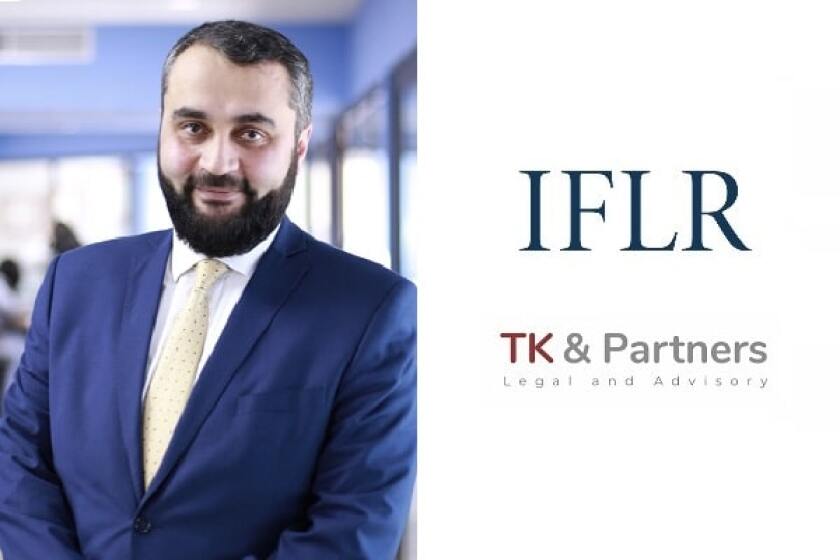Having had a long and varied career as a lawyer across different sectors, partner Misak Babajanyan of TK & Partners emphasises the importance of enjoying the work you do in your profession.
The former managing partner of the Armenian firm, who led between 2016 and 2018, now takes on multiple roles as a financial and corporate lawyer, a lecturer and a board member.
“Enjoying work gives rise to dedication and hard work,” Babajanyan told IFLR. “I deem that to be one of the principal factors of success.”
Speaking about opportunities at TK & Partners, he said, “I consider it to be one of the best options for young lawyers, who see themselves in the team for a long term.”
Prior to joining TK & Partners, Babajanyan was the CEO at Armenian Motor Insurers’ Bureau. From 2003 to 2013, he occupied various positions at the Central Bank of Armenia and notably headed the legal advice and development division, where he led and participated in the development project for the financial system’s legislation. In the role, he worked on producing concept papers on the development of financial institutions and instruments.
During his service at the Central Bank, he also headed the enforcement division, and later worked as the general counsel of the National Mortgage Company and for Home for Youth, a mortgage market refinancing company.
With TK & Partners, Babajanyan’s key areas of expertise have been in mergers and acquisitions (M&A), corporate law and financial law. He advises international and domestic clients on matters related to banking, insurance, the securities market and currency regulations, among other areas. He also has experience acting on commercial transactions, corporate governance and licensing.
In recent times, Babajanyan played a leading role as TK & Partners advised Ardshinbank and the Black Sea Trade and Development Bank (BSTDB) on their bond issuances. A further notable transactional matter involved the merger of two major Armenian companies that provide telecommunication services.
Babajanyan acknowledges the paramount importance of constantly developing your skills even as a practicing lawyer.
“This would be the concept of being ‘more than a lawyer’,” he said. “This implies having sufficient knowledge in spheres of client activity”.
Following a strong start to the year, transactions in Armenia slowed following the COVID-19 outbreak, much like the rest of the world. In early 2021, the World Bank suggested that Armenia can expect a yearly GDP growth of 3.1% rather than the 4.9% anticipated in the June 2020 edition.
Babajanyan stresses that TK & Partners have carefully assessed the economic challenges posed by COVID-19 in the country.
“Our firm has always been watchful over events with the potential to influence the business world,” said Babajanyan. “Main directions of ‘aid’ to our clients involve the publication of relevant client notes and alerts and discussions with concerned state bodies.”
Looking forward, Babajanyan feels that the healthcare and renewable energy sectors will be the industries to watch in Armenia over 2021, as the economy picks itself up from a difficult year. In addition, he notes that businesses involved with information technology, and cybersecurity in particular, could also expect a busy twelve months ahead.
He suggests that there could be regulatory changes that investors in Armenia should anticipate.
“Remarkable amendments to corporate laws are being discussed,” Babajanyan said, drawing reference to changes planned concerning employee stock ownership plan (ESOP) and corporate governance principles.
Babajanyan completed his bachelor’s and master’s degrees from Yerevan State University, before completing a doctorate in law at the Public Administration Academy of Armenia in 2007. The following year, he completed a certificate programme in international law and legal studies at the Fletcher School of Law and Diplomacy at Tufts University.
In addition to his work at TK & Partners, Babajanyan has taken on a number of non-profit and teaching roles in Armenia. Since 2017, he has served as a member of the board of directors at the Armenian Institute of Directors and at Capital Asset Management. He has also worked as a lecturer at institutions including the Public Administration Academy of Armenia, the Armenian State University of Economics, and the French University of Armenia.
He emphasises the importance of confidence and self-motivation for young people wanting to join the legal profession in Armenia.
“I truly believe in the absence of objective obstacles that could be impossible to overcome,” Babajanyan said. “The main barriers should be explored within oneself.”


